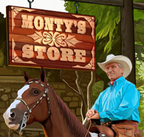I had the pleasure of seeing Monty in Australia in August and saw and heard about his work with returned veterans.
I was wondering whether Monty has considered working with other disabilities? From personal experience I know how much pleasure and sense of achievement horses can bring, having suddenly discovered at the age of 38 that I was born with a defective gene and was going blind.
I am using my case merely as an example. Up until diagnosis my whole life had been about my career, was working up to 18 hours a day in a very competitive environment, and within 12 months I had to give up working. Realising that depression was a real risk, I needed to find something to get me out of the house. I became involved with Riding for the Disabled (I was both client and volunteer there for 4 years) but unfortunately I found them wholly geared towards the physical exercise side of riding. I do appreciate what they do, but they don't really cater for people with the capacity and willingness to learn.
So I am now doing it alone, teaching myself with the assistance of the Online University, and words cannot express how pleased I am with the results. When your life suddenly becomes about everything you CAN'T do, it is is a real joy to find something you CAN do, and I think that a lot of other disabled people could benefit from Monty's teaching! I find the videos great as although I can't see everything he does, the commentary explains it all. My biggest problem is that we're on satellite internet and have a very small download limit so it will take a LONG time to watch all the videos...




Hi Pinkie,
Sorry to hear about your eyesight. As someone who has been around horses I have found that they are a great way for anyone to spend their free time. (Not that I have any with having a horse :P ) My niece's little brother (long story that I won't get into here) has Cerebral Palsy and we have found that being around horses was very calming for him. I have numerous friends with Autistic children who have also found horses to be a wonderful way for their child to connect with someone who isn't going to place any demands on them. I have to admit that I think my horse prefers the toddlers at my stable to me sometimes and they don't have any other concerns (I'm kind of funny about the word disabled, sorry, not nit picking it's just me). I know my mum used to take my autistic nephew out to the stables and he enjoyed it immensely.
I agree that Riding for the Disabled should be about everyone and everything, not just the physical side of the riding.
I sympathise with you regarding your Internet. I don't miss those days since I moved to the city. I have to agree though that Monty's clinic in August was amazing and I can't wait to see him again.
I think the whole concept of "Riding for the Disabled" needs re-thinking and bringing up to date. I went to assist a group but withdrew because the leader refused to acknowledge a Dually "we don't use things like that here". The idea of disabled people working with horses is commendable but sadly many methods and groups are paternalistic and patronising and focus on "helping" models rather than recognising the potential of partnership between human and horse. I am, of course, making a general comment and there are some fabulous examples across the world, particularly in the field of autism etc but there is a long way to go
My son is autistic - I find working with his horses on horsemanship has been beneficial to his view of social action and reaction - he thinks and reacts like a horse, and gives us a common language
Hi Pinkie
Lovely to hear your determined to fill your life with something that will be of value to you and any horse you meet and work with.
I am disabled with Lupus, Fybrimialgia, osteoarthritis and suffered a mild stroke when I was 32 which has left me with weakness down my left side, when I had my last child I also suffered from a hip displacement that has never healed. I've also started to go blind in my left eye, so things don't always look exactly right for me. My daughter is also autistic and she has found horses to be her comfort and confidence when she's needed it.
I think many establishments that I've seen for the disabled focus on the riding experience, but they could do much more if they understood the Equus language as Monty teaches.
There is a young autistic lad that comes out to us for mini rides, but with the ground being so wet it's not suitable to ride so we do practical sessions out in the field with the horses, starting small with our shetland Barnabay I've introduced the young lad to a form of join up whilst out inThe field. the aim is to let Barnabay come to the lad of his own free will. It's amazing how this young lad follows my instructions down to the smallest move of his hands to try and draw Barnabay to him and the excitement in the young lad when Barnabay offers his nose to the lad is a reward all on it's own.
you are in a unique situation with losing sight and having such a positive outlook that you will be able to connect with horses and ride even with the impairment. I'm assuming you don't own a horse, but if you did now would be the time to learn to trust it and to develop along with it so when the inevitable happens, you will still be able to handle a horse.
Let me explain more.... With my lupus I also suffer from light sensitivity, but only with artificial light, sunlight does not affect me. Being in the UK this makes winter time extremely hard in the home and whilst driving. In the home we have either no lights on or candle light. I prefer no lights there is just something about being in the dark that brings a peace, for me to go around in the dark however there has to be certain rules that my daughter and I have to follow, nothing is to be on the floor and everything such as tables and chairs etc remain in the same place. this way I can get around the house in darkness knowing I'm not going to fall over anything. I sometimes find myself counting the amount of steps it takes from the living room to the kitchen and the stairs, very much as if I was blind.
this same principle could be brought into your routine with horses, especially if you have your own.
something I found interesting too when training our boys is that if you need help, which I have needed in occasions, the horses are ready and willing to help. My 3 ponies are getting quite used to the words 'help me' when I struggle with my hips when walking and they go from walking next to me in the sweet spot to walking ahead of me so I can put my arm across Their backs to take the weight off my hips.
any horse will know when they look at your eyes that something is not quite right and because if their caring nature they will aim to assist you more! the same as they understand when a child that is autistic needs them to stand and be patient with the child.
Before you do loose total sight, and I hope you don't, try to familiarise your self with the whole horse, touching every part of it, feeling what is right so that if the inevitable happens you'll have the confidence to keep working along with horses. Learning to develop your other senses especially your hearing will be a way forward for you over the years to come. When you are in the riding school, start to count the number of horse steps is needed to go down the long sides and short sides of the school in walk trot and canter, this will fix firmly in your mind as your sight lessens where you are in the school. If you learn also to feel things, not sure if you understand an aura, but many people do feel auras and even with eyes closed you can still feel things around you without touching them. ie.. When a car passes by you, you feel the wind created by the car, you don't have to look to know it's there. If you can apply these things to where you ride you'll develop senses that many horse riders will never develop and it will be your strength to your horsemanship.
You are a strong lady and I admire your strength to reach out and keep moving forward. who knows where your zeal will take you!!
Mel x
Hi Mel, Pinkie and all,
Thank you so much for sharing your story with this forum! It's heartwarming to see what horses and being around horses can do for us, whatever our personal impairment may be!
I remember my first ride after backsurgery, some 14 years ago. The mare that I used to ride was so careful and took her resposability so serious, it brought tears to my eyes.
It didn't take long before I had the courage to open the door and ride out of the indoorarena and go out in the saddle with her, she gave me a sense of belonging that I'm still greatful for! Having had two hipreplacements recently I guess riding is not an option right now, but groundwork is what I intend to do as soon as I'm fit enough and the weather allows.
Take good care and please keep us posted!
Miriam
Miriam I hope it won't be too long before you're back in the saddle. remember to keep short stirrups when you do.
X
Hi Mel!
Thank you for your good wishes and an even better advice!
I'll take it one step at a time, who knows where it'll take me...
I'm very content about both surgeries, so nothing should be in my way.
For now, still doing rehab.
Miriam